2
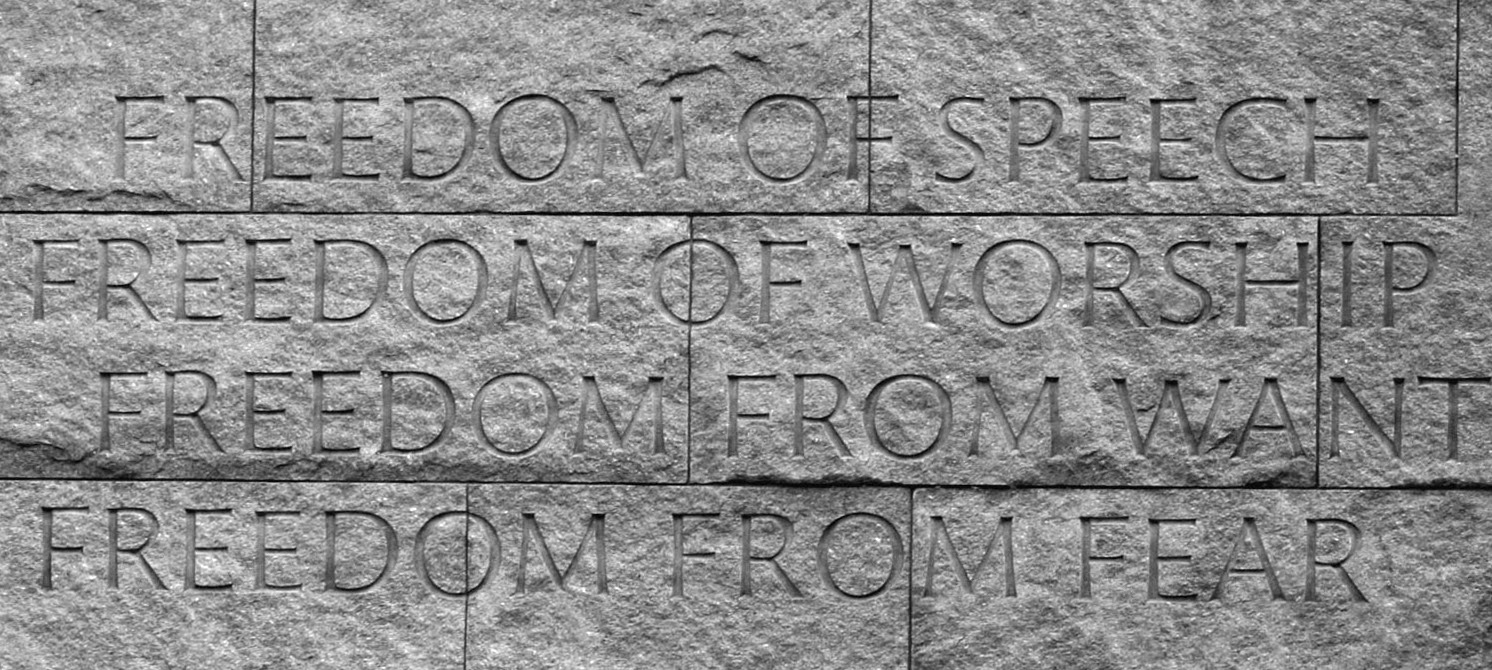
Key Terms
| Disparity | Ethnic Cleansing | Genocide |
| Human Rights | Human Trafficking | International Criminal Court (ICC) |
| Supranational Organization | Universal Declaration of Human Rights (UDHR) |
Learning Targets
2.1 I can analyze the Universal Declaration of Human Rights (UDHR) and summarize specific components within the UDHR.
2.2 I can identify specific examples of human rights issues.
2.3 I can use the UDHR to evaluate human rights issues and violations in the modern world.
“All human beings are born free and equal in dignity and rights.” This is stated in the very first Article of the Universal Declaration of Human Rights. The idea of Human Rights is one of the most important fundamentals of human co-existence. At the same time, human rights are subject to fierce debates and Human Rights violations are common all over the world. But what exactly are Human Rights? Who is responsible for protecting them? And do they really apply to all people? These are all questions we will seek out answers to throughout this unit of study.
What Are Human Rights?
Human rights are those activities, conditions, and freedoms that all human beings are entitled to enjoy, by virtue of their humanity. They include civil, political, economic, social, and cultural rights. Human rights are inherent, inalienable, interdependent, and indivisible, meaning they cannot be granted or taken away.
However, only governments are in a position to put laws and policies in place that protect human rights. Therefore, human rights are generally thought to be protected, or violated, by national governments.
Supranational organizations, such as the United Nations, write treaties that are often adopted by individual countries. When countries adopt these human rights treaties, they agree to both refrain from violating specific rights and to guarantee those rights to individuals within their country. However, this process is completely voluntary. The level of participation in the international human rights framework varies among countries.
The International Human Rights Framework
After World War II, there was an international need to identify the individual rights and liberties which all governments should respect. This involved establishing rules that countries were obliged to follow, and how to address what happens if a country breaches any of the rules. Thus, in the decade following the war, national governments cooperated in establishing the United Nations (UN), the Organization of American States (OAS), and the Council of Europe (COE).
These supranational organizations, then, prepared declarations, in the form of treaties, which spelled out the specific liberties that are understood to be human rights. The most prominent of these declarations were created by the United Nations. It is known as the Universal Declaration of Human Rights.
Universal Declaration of Human Rights
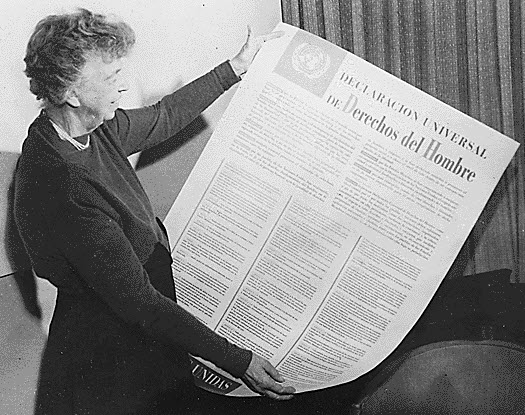
On December 10, 1948, the General Assembly of the United Nations adopted and proclaimed the Universal Declaration of Human Rights (the full text of which appears below). Following this historic act the Assembly called upon all Member countries to publicize the text of the Declaration and “to cause it to be disseminated, displayed, read and expounded principally in schools and other educational institutions, without distinction based on the political status of countries or territories.”
The following is the full text of the Universal Declaration of Human Rights.
Preamble
Whereas recognition of the inherent dignity and of the equal and inalienable rights of all members of the human family is the foundation of freedom, justice and peace in the world,
Whereas disregard and contempt for human rights have resulted in barbarous acts which have outraged the conscience of mankind, and the advent of a world in which human beings shall enjoy freedom of speech and belief and freedom from fear and want has been proclaimed as the highest aspiration of the common people,
Whereas it is essential, if man is not to be compelled to have recourse, as a last resort, to rebellion against tyranny and oppression, that human rights should be protected by the rule of law,
Whereas it is essential to promote the development of friendly relations between nations,
Whereas the peoples of the United Nations have in the Charter reaffirmed their faith in fundamental human rights, in the dignity and worth of the human person and in the equal rights of men and women and have determined to promote social progress and better standards of life in larger freedom,
Whereas Member States have pledged themselves to achieve, in co-operation with the United Nations, the promotion of universal respect for and observance of human rights and fundamental freedoms,
Whereas a common understanding of these rights and freedoms is of the greatest importance for the full realization of this pledge,
Now, Therefore THE GENERAL ASSEMBLY proclaims THIS UNIVERSAL DECLARATION OF HUMAN RIGHTS as a common standard of achievement for all peoples and all nations, to the end that every individual and every organ of society, keeping this Declaration constantly in mind, shall strive by teaching and education to promote respect for these rights and freedoms and by progressive measures, national and international, to secure their universal and effective recognition and observance, both among the peoples of Member States themselves and among the peoples of territories under their jurisdiction.
Article 1.
* All human beings are born free and equal in dignity and rights.They are endowed with reason and conscience and should act towards one another in a spirit of brotherhood.
Article 2.
* Everyone is entitled to all the rights and freedoms set forth in this Declaration, without distinction of any kind, such as race, colour, sex, language, religion, political or other opinion, national or social origin, property, birth or other status. Furthermore, no distinction shall be made on the basis of the political, jurisdictional or international status of the country or territory to which a person belongs, whether it be independent, trust, non-self-governing or under any other limitation of sovereignty.
Article 3.
* Everyone has the right to life, liberty and security of person.
Article 4.
* No one shall be held in slavery or servitude; slavery and the slave trade shall be prohibited in all their forms.
Article 5.
* No one shall be subjected to torture or to cruel, inhuman or degrading treatment or punishment.
Article 6.
* Everyone has the right to recognition everywhere as a person before the law.
Article 7.
* All are equal before the law and are entitled without any discrimination to equal protection of the law. All are entitled to equal protection against any discrimination in violation of this Declaration and against any incitement to such discrimination.
Article 8.
* Everyone has the right to an effective remedy by the competent national tribunals for acts violating the fundamental rights granted him by the constitution or by law.
Article 9.
* No one shall be subjected to arbitrary arrest, detention or exile.
Article 10.
* Everyone is entitled in full equality to a fair and public hearing by an independent and impartial tribunal, in the determination of his rights and obligations and of any criminal charge against him.
Article 11.
* (1) Everyone charged with a penal offence has the right to be presumed innocent until proved guilty according to law in a public trial at which he has had all the guarantees necessary for his defence.
* (2) No one shall be held guilty of any penal offence on account of any act or omission which did not constitute a penal offence, under national or international law, at the time when it was committed. Nor shall a heavier penalty be imposed than the one that was applicable at the time the penal offence was committed.
Article 12.
* No one shall be subjected to arbitrary interference with his privacy, family, home or correspondence, nor to attacks upon his honour and reputation. Everyone has the right to the protection of the law against such interference or attacks.
Article 13.
* (1) Everyone has the right to freedom of movement and residence within the borders of each state.
* (2) Everyone has the right to leave any country, including his own, and to return to his country.
Article 14.
* (1) Everyone has the right to seek and to enjoy in other countries asylum from persecution.
* (2) This right may not be invoked in the case of prosecutions genuinely arising from non-political crimes or from acts contrary to the purposes and principles of the United Nations.
Article 15.
* (1) Everyone has the right to a nationality.
* (2) No one shall be arbitrarily deprived of his nationality nor denied the right to change his nationality.
Article 16.
* (1) Men and women of full age, without any limitation due to race, nationality or religion, have the right to marry and to found a family. They are entitled to equal rights as to marriage, during marriage and at its dissolution.
* (2) Marriage shall be entered into only with the free and full consent of the intending spouses.
* (3) The family is the natural and fundamental group unit of society and is entitled to protection by society and the State.
Article 17.
* (1) Everyone has the right to own property alone as well as in association with others.
* (2) No one shall be arbitrarily deprived of his property.
Article 18.
* Everyone has the right to freedom of thought, conscience and religion; this right includes freedom to change his religion or belief, and freedom, either alone or in community with others and in public or private, to manifest his religion or belief in teaching, practice, worship and observance.
Article 19.
* Everyone has the right to freedom of opinion and expression; this right includes freedom to hold opinions without interference and to seek, receive and impart information and ideas through any media and regardless of frontiers.
Article 20.
* (1) Everyone has the right to freedom of peaceful assembly and association.
* (2) No one may be compelled to belong to an association.
Article 21.
* (1) Everyone has the right to take part in the government of his country, directly or through freely chosen representatives.
* (2) Everyone has the right of equal access to public service in his country.
* (3) The will of the people shall be the basis of the authority of government; this will shall be expressed in periodic and genuine elections which shall be by universal and equal suffrage and shall be held by secret vote or by equivalent free voting procedures.
Article 22.
* Everyone, as a member of society, has the right to social security and is entitled to realization, through national effort and international co-operation and in accordance with the organization and resources of each State, of the economic, social and cultural rights indispensable for his dignity and the free development of his personality.
Article 23.
* (1) Everyone has the right to work, to free choice of employment, to just and favourable conditions of work and to protection against unemployment.
* (2) Everyone, without any discrimination, has the right to equal pay for equal work.
* (3) Everyone who works has the right to just and favourable remuneration ensuring for himself and his family an existence worthy of human dignity, and supplemented, if necessary, by other means of social protection.
* (4) Everyone has the right to form and to join trade unions for the protection of his interests.
Article 24.
* Everyone has the right to rest and leisure, including reasonable limitation of working hours and periodic holidays with pay.
Article 25.
* (1) Everyone has the right to a standard of living adequate for the health and well-being of himself and of his family, including food, clothing, housing and medical care and necessary social services, and the right to security in the event of unemployment, sickness, disability, widowhood, old age or other lack of livelihood in circumstances beyond his control.
* (2) Motherhood and childhood are entitled to special care and assistance. All children, whether born in or out of wedlock, shall enjoy the same social protection.
Article 26.
* (1) Everyone has the right to education. Education shall be free, at least in the elementary and fundamental stages. Elementary education shall be compulsory. Technical and professional education shall be made generally available and higher education shall be equally accessible to all on the basis of merit.
* (2) Education shall be directed to the full development of the human personality and to the strengthening of respect for human rights and fundamental freedoms. It shall promote understanding, tolerance and friendship among all nations, racial or religious groups, and shall further the activities of the United Nations for the maintenance of peace.
* (3) Parents have a prior right to choose the kind of education that shall be given to their children.
Article 27.
* (1) Everyone has the right freely to participate in the cultural life of the community, to enjoy the arts and to share in scientific advancement and its benefits.
* (2) Everyone has the right to the protection of the moral and material interests resulting from any scientific, literary or artistic production of which he is the author.
Article 28.
* Everyone is entitled to a social and international order in which the rights and freedoms set forth in this Declaration can be fully realized.
Article 29.
* (1) Everyone has duties to the community in which alone the free and full development of his personality is possible.
* (2) In the exercise of his rights and freedoms, everyone shall be subject only to such limitations as are determined by law solely for the purpose of securing due recognition and respect for the rights and freedoms of others and of meeting the just requirements of morality, public order and the general welfare in a democratic society.
* (3) These rights and freedoms may in no case be exercised contrary to the purposes and principles of the United Nations.
Article 30.
* Nothing in this Declaration may be interpreted as implying for any State, group or person any right to engage in any activity or to perform any act aimed at the destruction of any of the rights and freedoms set forth herein.
Organizations That Promote Human Rights and The UDHR
Examples of Non-Governmental Organizations (NGOs)
International Federation for Human Rights
The International Federation for Human Rights (FIDH) is nonpartisan, nonsectarian, and independent of any government, and its core mandate is to promote respect for all the rights set out in the Universal Declaration of Human Rights, the International Covenant on Civil and Political Rights, and the International Covenant on Economic, Social and Cultural Rights.
Amnesty International
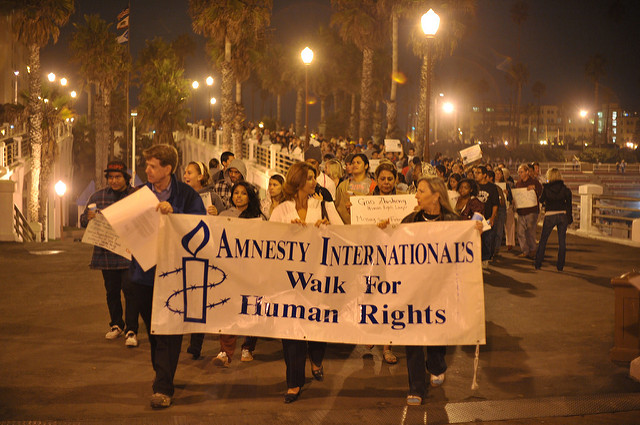
In 1988, director Stephen R. Johnson and 41 international animators, musicians, and producers created a 20-minute video for Amnesty International to celebrate the 40th Anniversary of the Universal Declaration. The video was to bring to life the Declaration’s 30 articles.
Amnesty International celebrated Human Rights Day and the 60th anniversary of the Universal Declaration all over the world by organizing the “Fire Up!” event.
Unitarian Universalist Service Committee
The Unitarian Universalist Service Committee (UUSC) is a nonprofit, nonsectarian organization whose work around the world is guided by the values of Unitarian Universalism and the Universal Declaration of Human Rights. It works to provide disaster relief and promote human rights and social justice around the world.
Quaker United Nations Office and American Friends Service Committee
The Quaker United Nations Office and the American Friends Service Committee work on many human rights issues, including improving education on the Universal Declaration of Human Rights. They have developed a Curriculum to help introduce High School students to the Universal Declaration of Human Rights.
American Library Association
In 1997, the council of the American Library Association (ALA) endorsed Article 19 from the Universal Declaration of Human Rights. Along with Article 19, Article 18 and 20 are also fundamentally tied to the ALA Universal Right to Free Expression and the Library Bill of Rights. Censorship, the invasion of privacy, and interference of opinions are human rights violations according to the ALA.
Examples of Intergovernmental Organizations (IGOs)
One can think of the different mechanisms for the protection of human rights as overlapping umbrellas of distinct sizes, positioned around the globe. The different umbrellas are made up of the courts and monitoring bodies of the following universal and regional human rights systems:
- United Nations
UN Human Rights Council
human rights treaty bodies
independent experts known as “special procedures“
Universal Periodic Review
- Africa
African Court on Human and Peoples’ Rights
African Commission on Human and Peoples’ Rights
- The Americas
Inter-American Court of Human Rights
Inter-American Commission on Human Rights
- Europe
European Court of Human Rights
European Committee of Social Rights
Council of Europe Commissioner for Human Rights
- The Middle East & North Africa
Arab Human Rights Committee
- Southeast Asia
ASEAN Intergovernmental Commission on Human Rights
Each of the above mentioned organizations have different functions and oversee different regions of the world. In general, the responsibilities may include: deciding complaints against specific countries, engaging in independent monitoring through country visits and reporting, and reviewing country’s reports on their own compliance with human rights standards.
Human Rights Violations
Human rights violations occur on a daily basis throughout the world. Some prominent examples of the most extreme human rights abuses include human trafficking, ethnic cleansing, and genocide.
Human trafficking is the trade of humans, most commonly for the purpose of sexual slavery, forced labor, or commercial sexual exploitation for the trafficker or others. Human trafficking is also known as ‘modern day slavery’. This may encompass providing a spouse in the context of forced marriage, or the extraction of organs or tissues. Human trafficking is the trade in people, and does not always involve the movement of the person from one place to another.
Human trafficking can occur within a country or internationally. Human trafficking is a crime against the person because of the violation of the victim’s rights of movement through coercion and because of their commercial exploitation.
Human trafficking is thought to be one of the fastest-growing activities of international criminal organizations, and is said to generate an estimated $7 billion to $9.5 billion globally each year. Human trafficking is condemned as a violation of human rights by many international NGOs and IGOs.
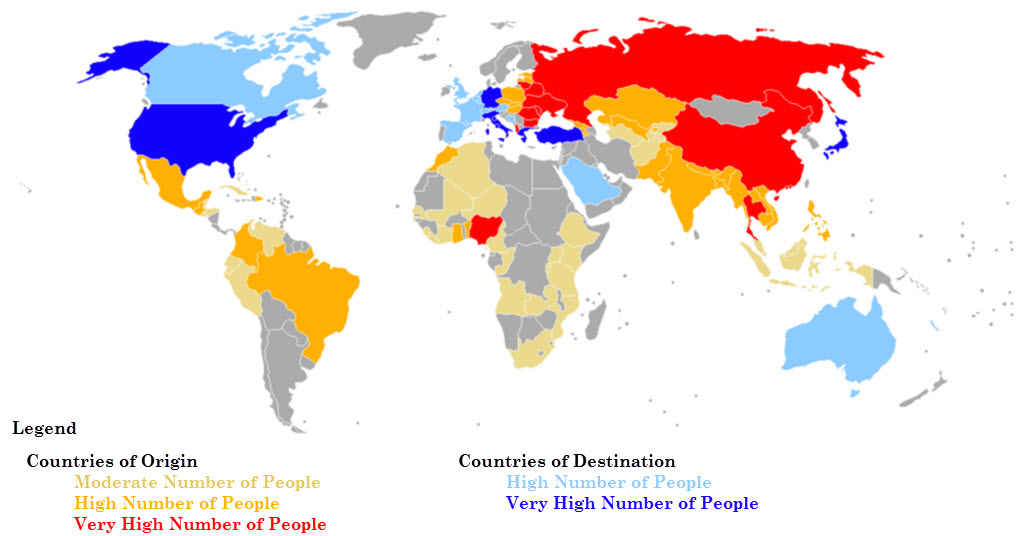
Ethnic cleansing is the systematic forced removal of ethnic or religious groups from a given territory by a more powerful ethnic group, with the intent of making it ethnically homogeneous. The forces applied may be various forms of forced migration such as deportation, intimidation, as well as mass murder and rape.
Ethnic cleansing is usually accompanied with efforts to remove physical and cultural evidence of the targeted group in the territory by destructing their homes, social centers, farms, infrastructure, desecration of their monuments, cemeteries, and places of worship.
Genocide is the intentional action to systematically eliminate an ethnic, national, racial, or religious group. The word is a combination of “genos” (race, people) and “cide” (to kill). The United Nations Genocide Convention defines it as “acts committed with intent to destroy, in whole or in part, a national, ethnical, racial or religious group”.
The term genocide was coined in response to the Armenian Genocide and the Holocaust; it has subsequently been applied to many other mass killings, well-known examples including the Native American Genocide, the Greek Genocide, the Assyrian Genocide, Holodomor, the 1965–66 Indonesian tragedy, the 1971 Bangladesh genocide, the Cambodian genocide, and more recently the Kurdish genocide in Iraq, the Bosnian genocide, and the Rwandan genocide.
Enforcing Human Rights
There are several supranational and intergovernmental organizations that oversee that human rights are enforced. In the instance of a major human rights abuse or violation, these organizations will try the abusers/violators in a courtroom. Punishments may include jail time and/or reparations.
The International Criminal Court (ICC or ICCt) is an intergovernmental organization that sits in The Hague in the Netherlands. The ICC has the jurisdiction to prosecute individuals for the international crimes of genocide, crimes against humanity, and war crimes. The ICC is intended to complement existing national judicial systems and it may, therefore, only exercise its jurisdiction when certain conditions are met, such as when national courts are unwilling or unable to prosecute criminals, or when the United Nations Security Council or individual countries refer investigations to the Court.

Countries may also bring complaints they have against other countries before the International Court of Justice. These cases can involve individuals’ human rights from the standpoint of one country’s allegation that another violated the terms of an international agreement. The International Labour Organization (ILO) also oversees countries’ compliance with international labor standards, including by receiving inter-State complaints concerning alleged violations of ILO conventions.
Finally, national, or “domestic,” bodies also play an important role in implementing and enforcing international human rights standards, including through national human rights institutions (NHRIs), domestic civil and criminal legal proceedings, the exercise of universal jurisdiction, and truth and reconciliation commissions.
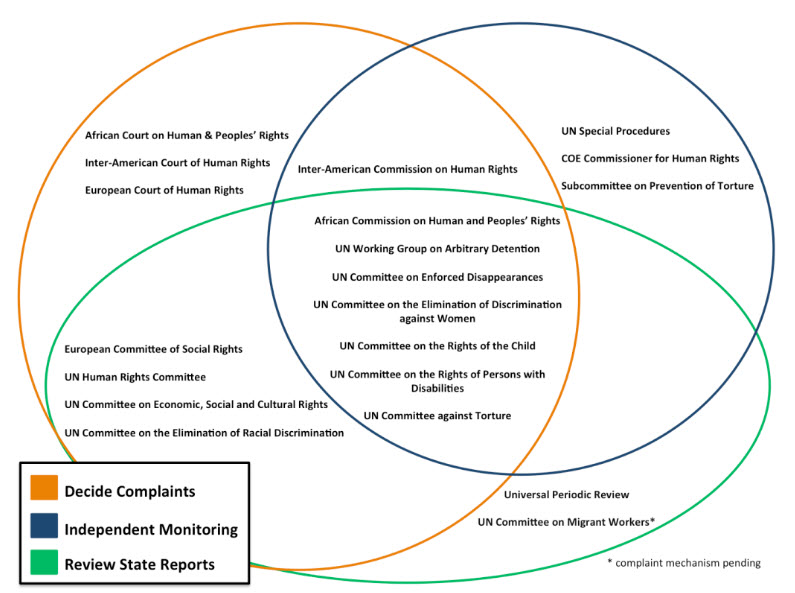
Links to Resources
Current Events
Human Rights
The Human Right’s Watch World Report of Human Rights in 2014:
http://www.oercommons.org/courses/human-rights-watch-world-report-2014/view
The ‘human rights key’: a visual representation of human rights:
http://www.oercommons.org/courses/the-human-rights-key/view
Human Rights Violations
The FBI’s website that posts key updates about human trafficking: https://www.fbi.gov/about-us/investigate/civilrights/human_trafficking
Youth for Human Rights examines specific examples of human rights abuses: http://www.youthforhumanrights.org/voices-for-human-rights/human-rights-abuses.html
Intergovernmental Organizations Focused on Human Rights
The United Nations Human Rights Office of the High Commissioner: http://www.ohchr.org/en/hrbodies/hrc/pages/hrcindex.aspx
The official website of the International Criminal Court
Non-governmental Organizations Focused on Human Rights
Amnesty International, one of the largest Human Rights NGOs: http://www.amnestyusa.org/
Human Rights Watch, a human rights ‘watchdog group’: https://www.hrw.org/
Universal Declaration of Human Rights
An online version of the UDHR:
http://www.un.org/en/universal-declaration-human-rights/
Youth for Human Rights videos on each of the UDHR articles: http://www.youthforhumanrights.org/what-are-human-rights/universal-declaration-of-human-rights/introduction.html
Youth for Human Rights simplified version of the UDHR articles: http://www.youthforhumanrights.org/what-are-human-rights/universal-declaration-of-human-rights/articles-1-15.html